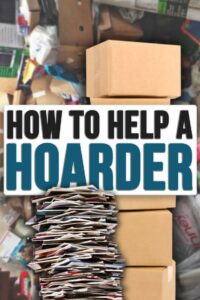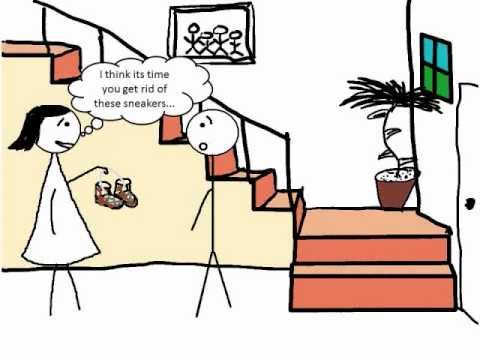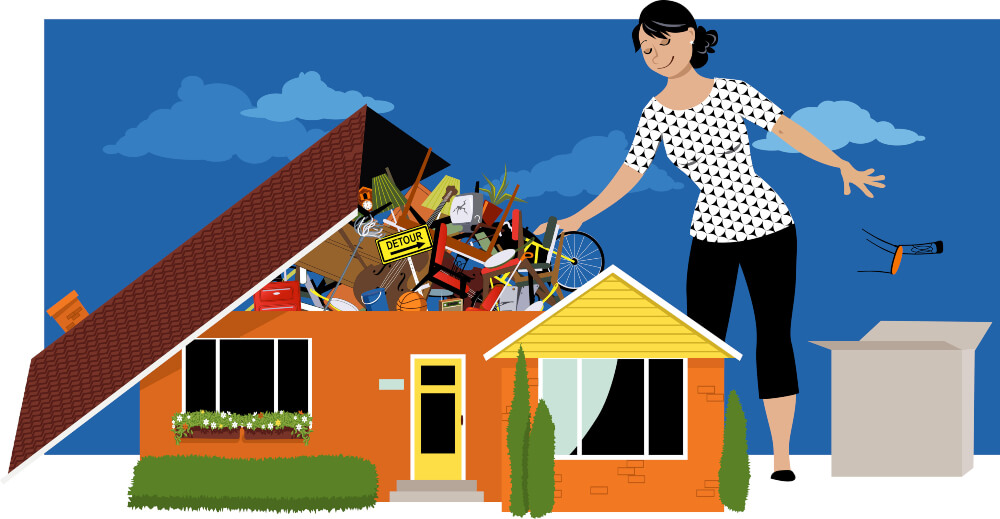It’s not always easy to tell when someone is a hoarder. Many people who hoard can hide their disorder quite well. However, if you know what to look for, some signs can indicate that someone you love may be dealing with a hoarding disorder. This blog post will help you understand hoarding disorder, and learn how to talk to your loved ones about it. We will also provide tips and suggest therapies to help hoarders to seek treatment and support.
Contents
Understanding Hoarding Disorder

Hoarding disorder is a mental health condition that is characterized by the excessive accumulation of objects and the inability or unwillingness to discard them. Hoarders often feel an emotional attachment to their possessions and see them as valuable, even if they have no practical use.
Dangers of Hoarding
Hoarding can also pose a number of safety hazards.
- For example, if a person is hoarding flammable materials, it increases the risk of fire.
- Additionally, hoarders are more likely to trip and fall because of the clutter in their homes.
Types of Hoarding Disorder
There are two types of hoarding disorder: functional and non-functional.
- Functional hoarders can use and enjoy their possessions, and
- Non-functional hoarders cannot use or enjoy their belongings and often live in squalor.
Causes And Risk Factors
The exact cause of hoarding disorder is unknown, but it is believed to be caused by a combination of genetic and environmental factors.
Several risk factors can increase a person’s likelihood of developing a hoarding disorder. These include:
- Being over the age of 60
- A family history of hoarding disorder
- Having a mental health condition, such as anxiety or depression
Recognizing Loved One With Hoarding Disorder

If you think that someone you love may be dealing with a hoarding disorder, there are some signs you can look for.
Some common symptoms of hoarding disorder include:
- Inability to discard possessions
- Excessive accumulation of objects
- Feelings of anxiety or distress when getting rid of objects
- Obsessive thoughts about possession and acquisition of objects
How It Affects Family And Friends
Hoarding disorder can be incredibly disruptive to the lives of family and friends. People who hoard often have difficulty keeping their homes clean and organized. Thus, it can lead to unsanitary living conditions and a lot of stress for those close to them.
Talking To Loved One About Their Hoarding
It can be difficult to talk to loved ones about their hoarding, but it is an important step in helping them seek treatment.
There are some dos and don’ts of talking to a hoarder about their disorder:
Dos:
- Be supportive and understanding
- Express your concerns in a factual, objective way
- Approach the conversation in a gentle and non-judgmental way
Don’ts:
- Criticize or judge the hoarder
- Make assumptions about why they are hoarding
- Pressure them to get rid of their possessions immediately
Helping Your Loved One With Hoarding

There are many things you can do to help your loved one with hoarding. Some helpful tips and techniques include:
- Trying to get the hoarder to agree to see a therapist
- Offering to help sort and organize the hoarder’s possessions
- Making a cleaning schedule and helping the hoarder stick to it
- Creating a space for the hoarder to store their possessions safely
Motivation Tips
It can be difficult to motivate a hoarder to seek treatment and support. However, there are some things you can do to encourage them. However, some motivation tips include:
- Keeping communication open
- Committing to change together
- Trying not to get angry or frustrated
- Offering encouragement and positive reinforcement
Workable Techniques
One of the best things you can do to help a hoarder is to offer to declutter and clean up their home. This will help them feel less overwhelmed by their possessions and make it easier for them to keep their home clean.
Steps To Declutter:
- Creating a vision board or mood board to inspire change
- Making a list of goals and breaking them down into small, achievable steps
- Putting items in a “keep” and “discard” pile to make the decision-making process easier
- Throw away any trash and donate or sell any items that are in good condition
- Using a timer to limit how long someone can spend organizing or sorting their possessions
Steps To Cleaning Up Home
- Create a cleaning schedule and stick to it
- Designate specific areas for the hoarder’s possessions
- Make sure to put away any items that are not in use or of no use
Encouraging Loved One To Seek Treatment And Support

The most important thing you can do is encourage your loved one to seek treatment and support.
There are many resources available to help hoarders, including:
- Therapists
- Support groups
Treatment Options
There are many different treatment options available for hoarders. However, some of the most common treatments include:
- Therapy
- Medication
They are often the most effective treatment options for hoarders. However, not everyone will respond to the same treatments. Thus, it is important to work with a therapist or doctor to find the best treatment option for your loved one.
Therapy Options
There are many different types of therapy available for hoarders. However, some common therapies include:
- Motivational interviewing (MI)
- Interpersonal psychotherapy (IPT)
- Cognitive-behavioral therapy (CBT)
- Family-focused cognitive-behavioral therapy (CFCBT)
Medications
Many different medications can be used to treat hoarding disorder. However, some common medications include:
- Atypical antipsychotics
- Selective serotonin reuptake inhibitors (SSRIs)
- Serotonin-norepinephrine reuptake inhibitors (SNRIs)
NOTE: This is not an exhaustive list. Many different medications can be used to treat hoarding disorder. Therefore, it is important to work with a doctor to find the best medication for your loved one.
Conclusion
Hoarding disorder is a serious condition that can be very disruptive to a person’s life. However, with the right treatment and support, it is possible to overcome it. If you think that someone you love may be dealing with a hoarding disorder, it is important to approach them in a gentle and understanding way. Fortunately, there are many resources available to you. Thus, with patience and perseverance, you can help your loved ones overcome their disorder and lead healthier, happier life.
A Word From Therapy Mantra
Your mental health — Your psychological, emotional, and social well-being — has an impact on every aspect of your life. Positive mental health essentially allows you to effectively deal with life’s everyday challenges.
At TherapyMantra, we have a team of therapists who provide affordable online therapy to assist you with issues such as depression, anxiety, stress, workplace Issues, addiction, relationship, OCD, LGBTQ, and PTSD. You can book a free therapy or download our free Android or iOS app.


